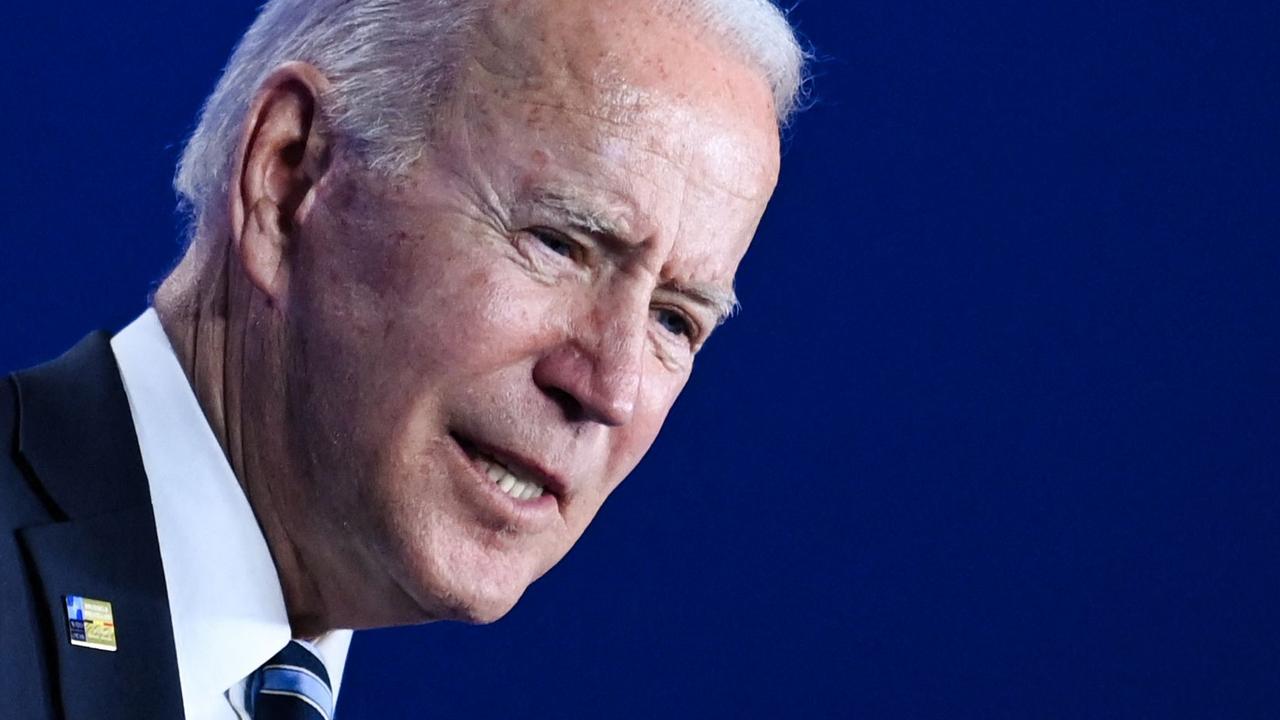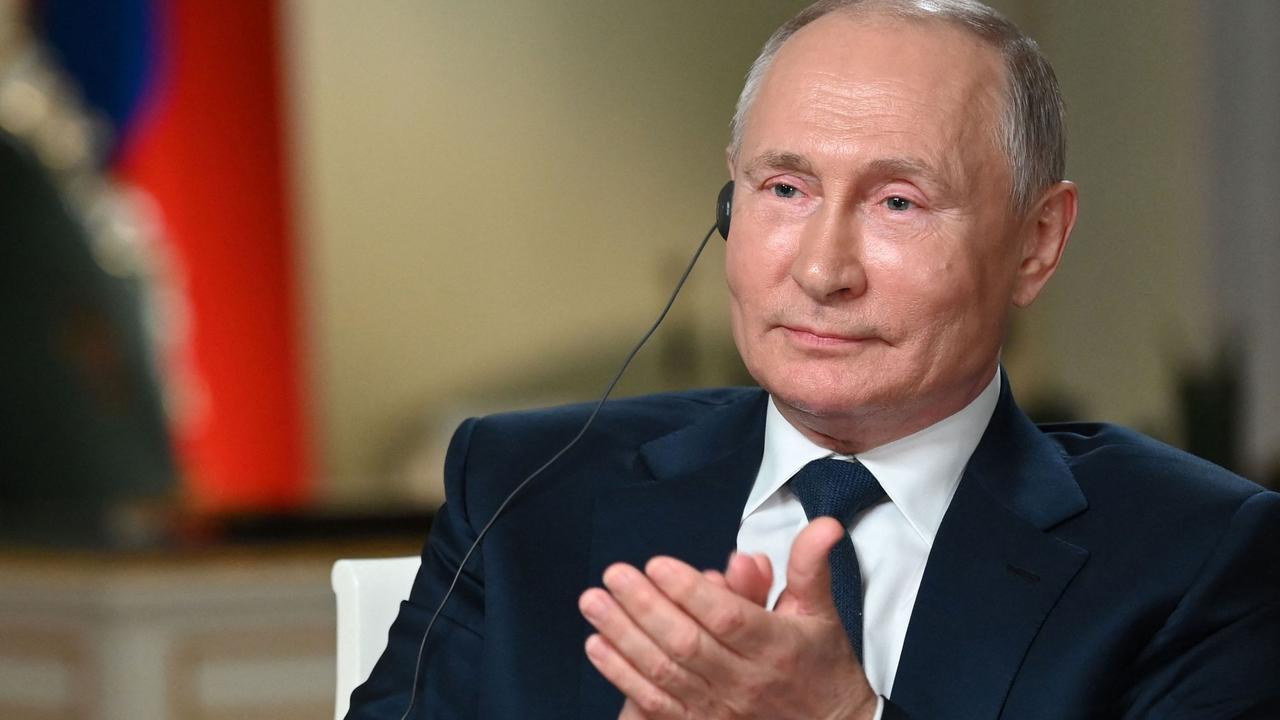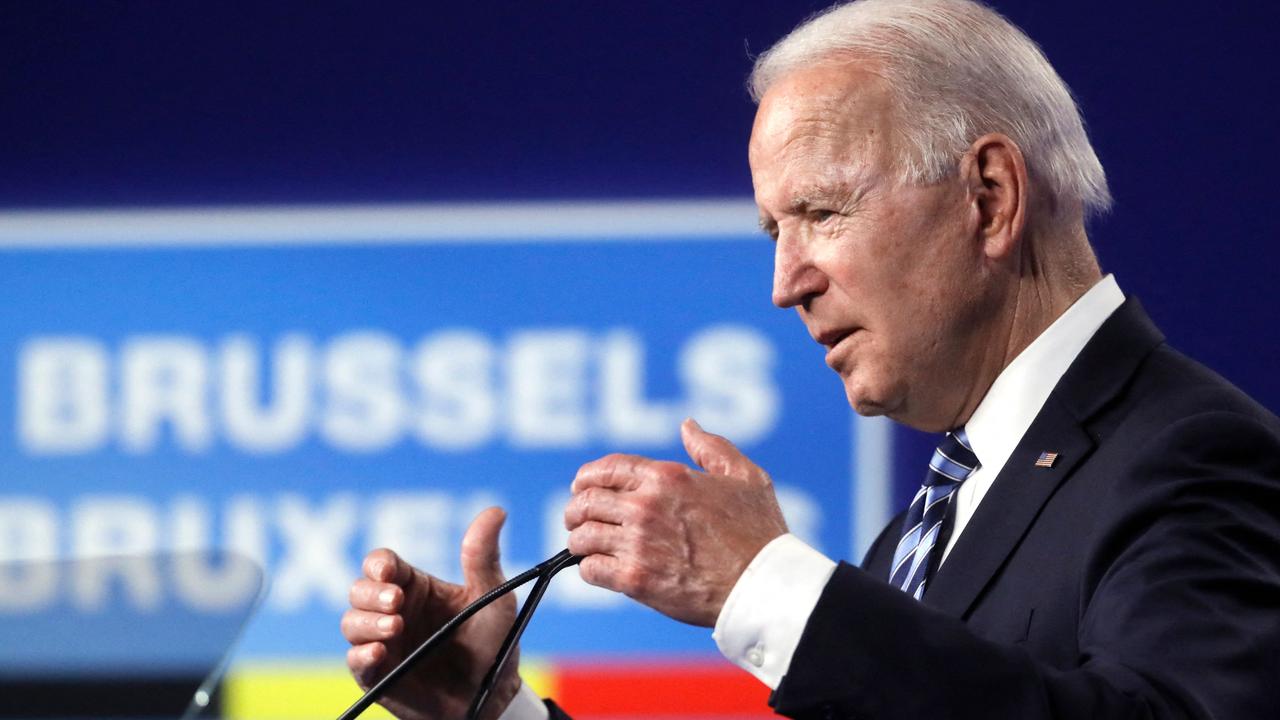Joe Biden answers awkwardly when asked about calling Vladimir Putin a ‘killer’ ahead of their summit
Asked a simple yes or no question, US President Joe Biden first struggled to find the words. Then he fell into an excruciatingly long silence.
US President Joe Biden showed up two-and-a-half hours late for a media conference in Brussels today, where he was grilled about his upcoming summit with Russian President Vladimir Putin.
Mr Biden, currently on his first overseas trip since taking office, is holding a bilateral meeting with Putin in Geneva on Wednesday.
Today he met with NATO leaders, and one topic of discussion was “Russia’s aggressive acts” which “pose a threat to NATO and our national security”.
“I shared with our allies what I’ll convey to President Putin: that I’m not looking for conflict with Russia, but that we will respond if Russia continues its harmful activities. And we will not fail to defend NATO or stand up for democratic values,” Mr Biden said.
RELATED: Biden’s gamble on Putin summit could backfire
There was an awkward moment midway through the press conference as Mr Biden was asked whether he still stood behind previous remarks as a candidate calling Putin a “killer”.
Putin was himself asked about those remarks in a recent TV interview. The Russian leader laughed at the question and said it was not “something I worry about in the least”.
“In a weekend interview, Vladimir Putin laughed at the suggestion that you had called him a killer. Is that still your belief, that he is a killer?” a reporter asked Mr Biden today.
The US President also began his answer by laughing.
“I’m laughing too,” he said.
“Actually I – well, look, he has made clear that uh, uh ...”
There was an excruciatingly long pause at this point – seven seconds of silence – as Mr Biden pondered his response.
“The answer is, I believe he has in the past essentially acknowledged that there were certain things he would do, or did do,” he finally continued.
“But look. When I was (first) asked that question on air, I answered it honestly, but I don’t think it matters a whole lot in terms of this next meeting we’re about to have.”
Not the clearest of answers, then.
The same reporter also asked Mr Biden how he could ever trust Putin’s word, if he agreed to co-operate with the US.
“I’d verify first and then trust,” said Mr Biden.
“In other words, everything would have to be shown to be actually occurring. It’s not about trusting, it’s about agreeing.
“When you write treaties with your adversaries, you don’t say, ‘I trust you.’ You say, ‘This is what I expect, and if you violate what we agreed to, the treaty’s off.’
“I’m hoping that President Putin concludes that there is some interest, in terms of his own interest, in changing the perception the world has of him. In terms of whether or not he will engage in behaviour that’s more consistent with what is considered to be appropriate behaviour for a head of state.”
A handful of other significant questions came up during the media conference. Read on for a quick summary.
On setting expectations for the summit
Another reporter asked Mr Biden whether he agreed that Americans “shouldn’t expect much” in the way of progress or substantive agreement from the meeting with Putin.
“I’ve been doing this a long time. The last thing anyone would do is negotiate in front of the world press as to how he’s going to approach a critical meeting with an adversary,” he said.
“I will tell you this. I’m going to make clear to President Putin that there are areas where we can co-operate if he chooses. And if he chooses not to co-operate, and acts in a way that he has in the past, relative to cybersecurity and some other activities, then we will respond in kind.
“We should decide where it’s in our mutual interests, in the interest of the world, to co-operate. And see if we can do that. And the areas where we don’t agree, make it clear where the red lines are.
“I have met with him (before). He’s bright, he’s tough, and I have found that he is, as they say when I used to play ball, a worthy adversary.”
As compliments ago, that last sentence isn’t quite on the same level as Mr Biden’s predecessor Donald Trump, who called Putin a “genius”. But it is a jarringly positive assessment coming from the current President.


On the mood of other world leaders
Mr Biden was asked whether any other world leaders he’d met had expressed concerns about him granting Putin a bilateral summit.
Republicans have argued that he risks “rewarding” Putin, who will use the high profile meeting to boost his own political standing back in Russia.
“Every world leader here, as a member of NATO, that spoke today – and most of them mentioned it – thanked me for meeting with Putin now. Every single one that spoke. And I think there were probably about 10 or 12 who spoke to it,” Mr Biden said.
“They were happy that I was going to do that, and I thought it was thoroughly appropriate that I do, and I had discussions with them about what they thought was important from their perspective.
“The interesting thing is – and I’m not being critical of the press, I really mean this, give you my word – but generically, you all thought, ‘Was Biden meeting him too soon?’ I haven’t found a world leader who doesn’t think it’s not soon enough, just soon enough.
“There is a consensus. And they thanked me for being willing to talk to them about the meeting and what I intended to do.”
On imprisoned opposition leader Alexei Navalny
Among the Putin government’s more recent indiscretions is the imprisonment of Russia’s most prominent opposition figure, Alexei Navalny.
Mr Navalny was previously poisoned with a Soviet-era nerve agent.
A reporter asked Mr Biden what it would mean for the US-Russia relationship if Mr Navalny were to die.
“Navalny’s death would be another indication that Russia has little or no intention of abiding by basic, fundamental human rights. It would be a tragedy,” he replied.
“It would do nothing but hurt (Putin’s) relationships with the rest of the world, in my view, and with me.”

On the prospect of Ukraine joining NATO
Speaking to wire agencies earlier in the day, Ukrainian President Volodymyr Zelensky said he wanted a clear “yes or no” answer from Mr Biden on whether he supported a move towards making Ukraine part of NATO.
This would involve Ukraine being allowed to participate in the Membership Action Plan, a program of advice and support tailored to individual countries who wish to join NATO.
Mr Zelensky has been pushing for NATO to accelerate his country’s entry into the alliance, given Ukraine’s ongoing confrontations with Russia.
“It depends on whether they meet the criteria. The fact is, they still have to clean up corruption. They still have to meet other criteria to get into the Action Plan,” Mr Biden said when questioned on the subject.
“So, you know, school’s out on that question. It remains to be seen. In the meantime, we will do all we can to put Ukraine in a position to be able to resist Russian physical aggression.
“It will depend not just on me, whether or not we conclude that Ukraine can become part of NATO, it will depend on the alliance, and how they vote.”
Not the answer Mr Zelensky was looking for. He’ll get a chance to ask Mr Biden about it in person when he visits the White House in July.
On the lingering spectre of Trump
A reporter told Mr Biden that US allies were “pretty rattled” by the Capitol riot on January 6, in which a mob of Mr Trump’s supporters attempted to stop Congress from certifying his loss in the 2020 presidential election.
“They may still be alarmed by the continued hold that Donald Trump has over the Republican Party,” she said.
“What do you say to those allies at these meetings about how the next president of the United States can keep any promises you make?”
So, in essence, how can allies trust the US to keep its commitments if Mr Trump returns to the White House in 2025?
“What I’m saying to them is, watch me,” Mr Biden said.
“People don’t doubt that I mean what I say, and they believe that I keep my commitments when I say it. I’m not making any promises to anyone that I don’t believe are overwhelmingly likely to be kept.
“I think an awful lot of people thought that me showing up at the G7 would not produce any kind of enthusiasm about American leadership and where America was. I would suggest that it didn’t turn out that way.
“The leaders I’m dealing with in NATO and the G7 know our recent history, know generically the character of the American people, and know where the vast centre of the public stands. Not Democrat or Republican, but who we are. We’re a decent, honourable nation.
“They’ve seen things happen, as we have, that shocked them and surprised them. But I think they believe, like I do, that the American people are not going to sustain that kind of behaviour.”




